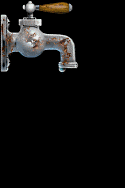Water Glossary
We live on the only BLUE planet of the universe, yet we seem to forget how precious to our lives and the life of all living beings is the waterthat makes the planet blue. 'Click' on any of the following letters to access an alphabetical section of the Water Glossary:
[A] [B] [C] [D] [E] [F] [G] [H] [I] [J] [K] [L] [M] [N] [O] [P] [Q] [R] [S] [T] [U] [V] [W] [X] [Y] [Z]

Water
- 75% of Americans are chronically dehydrated. This is also true for half the world population.
- In 37% of North Americans, the thirst trigger is so weak that it is often mistaken for hunger.
- Even MILD dehydration will slow down a person metabolism as much as 3%.
- One glass of water will shut down midnight hunger pangs for almost 100% of the dieters studied in a University of Washington study, which is a great thing to keep in mind especially if you're on a diet.
- Lack of water is the first cause of daytime fatigue.
- Drinking 8-10 glasses of water per day could significantly ease back and joint pain.
- A mere 2% drop in body water can trigger fuzzy short-term memory, trouble with basic math, and difficulty focusing on the computer screen or even on a printed page.
- Drinking 5 glasses of water daily decreases the risk of colon cancer by 45%, can slash the risk of breast cancer by 79%., and a person is also 50% less likely to develop bladder cancer.
Blue Planet
"We live on the blue planet with more than 70% of the Earth's surface covered by water. Yet more than 1 billion people still lack safe, clean drinking water and another two billion lack adequate treatment for wastewater. With global water wars looming, clues from the ocean indicate that we are on the verge of a significant change in climate.
Warmer temperatures are causing increased melting of ice at the poles, altering the movement of warm ocean currents. How will changing climate and diminishing freshwater supplies alter human survival, global tensions, and the natural landscape? How will it affect us, living beside 20% of the world’s freshwater?"
From David G. Gallo, Water Crisis on the Blue Planet
The Hydrosphere

Earth is the only planet in the solar system with abundant liquid water on its surface. Water has chemical and physical properties not matched by any other substance, and it is essential for life on Earth. Water has a great ability to absorb heat. The oceans store much of the heat Earth gets from the sun. The electrical charges on water molecules give water a great ability to attract atoms from other substances. This quality allows water to dissolve many things. Water's ability to dissolve materials makes it a powerful agent in breaking down rocks. Liquid water on Earth affects not just the surface but the interior as well. Water in rocks lowers the melting temperature of rock. Water dramatically weakens rocks and makes them easier to melt beneath Earth's surface.
About 71 percent of Earth's surface is covered by water, most of it in the oceans. Ocean water is too salty to drink. Only about 3 percent of Earth's water is fresh water, suitable for drinking. Much of Earth's fresh water is not readily available to people because it is frozen in the polar ice caps or beneath Earth's surface. Polar regions and high mountains stay cold enough for water to remain permanently frozen.
The region of permanent ice on Earth is sometimes called the cryosphere. Ocean waters cover most of Earth's surface. This satellite view shows the Indian Ocean, partly bordered by Africa, Asia, and Australia, and below it the Southern Ocean surrounding Antarctica. Reference and image credit: NASA/Goddard Space Flight Center and ORBIMAGE/SeaWiFS Project

Connect with us
Contact us today